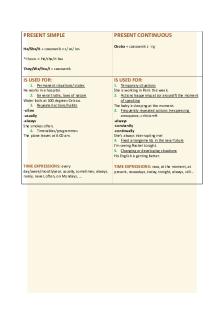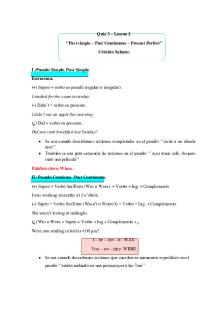3. Present perfect simple and continuous PDF

| Title | 3. Present perfect simple and continuous |
|---|---|
| Author | Justine Duquenoy |
| Course | Langue anglaise |
| Institution | Université de Picardie Jules Verne |
| Pages | 2 |
| File Size | 75.3 KB |
| File Type | |
| Total Downloads | 81 |
| Total Views | 193 |
Summary
Mme Dunkel...
Description
Present Perfect simple and continuous Present Perfect simple: have / has+ past participle We use the present perfect simple: to talk about past experiences when you don't say when something happened. e.g: Have you ever written a blog? with just, yet, and already. e.g: We've just landed but we haven't got off the plane yet. / I've already told you three times. with superlatives and the first, second, last time, etc. e.g: It's the best book I've ever read. for finished actions (when no time is specified) which have present results. e.g: My computer's crashed! Look, it's started snowing. with non-action verbs ( = verbs not usually used in the continuous form,(have, know, like, etc.) to say that something started in the past and is still true now. This use is common with time expressions: How long …? for or since, all day/ evening, etc. Don't use the present simple or continuous in this situation: I know Miriam since I was a child. e.g: I've known Miriam since I was a child. / My sister has had flu for ten days now. when we say or ask how much/ many we have done or how often we have done something up to now. e.g: How many Agatha Christie novels have you read? They've seen each other twice this week. Present Perfect continuous: have / has+ been+ verb + -ing We use the present perfect continuous: with action verbs, to say that an action started in the past and is still happening now. This use is common with time expressions like How long .. . ?, for or since, all day / evening, etc. Don't use the present simple or continuous in this situation. e.g: I know Miriam since I was a child. for repeated actions, especially with a time expression e.g: all day, recently. for continuous actions which have just finished (but which have present results).
To talk about an unfinished action we normally use the present perfect continuous with action verbs and the present perfect simple with non-action verbs. e.g: I've been learning French for the last three years. He's liked classical music since he was a teenager. Some verbs can be action or non-action depending on their meaning, e.g: have piano lessons= action, have a car= non-action. e.g: She's been having piano lessons since she was a child. / They've had that car for at least ten years. With the verbs live or work you can often use the present perfect simple or continuous. However, we normally use the present perfect continuous for shorter, more temporary actions.
e.g: We've lived in this town since 1980. We've been living in a rented flat for the last two months. The present perfect simple emphasizes the completion of an action (= the kitchen has been painted). The present perfect continuous emphasizes the duration of an action, which may or may not be finished (= the painting of the kitchen may not be finished yet). e.g: I've painted the kitchen. I've been painting the kitchen.
A page 134 1. She's worked/ been working here since July. BOTH 2. Your mother has phoned three times this morning! 3. The kids are exhausted because they’ve been running around all day. 4. Tim and Lucy haven't seen our new house. 5. I've never met her boyfriend. Have you? 6. It's been raining all morning. 7. Bill has just gone to work. He won't be back till this evening. 8. My sister has been living alone since her divorce. B page 134 1. We have known Jack and Ann for years. (know) 2. You look really hot. Have you been working at the gym? (you / work out) 3. Emily hasn’t done her homework yet, so I'm afraid she can't go out. (not do) 4. They don't live in London; they have moved. (move) 5. I haven’t had time to cook anything. (not have) 6. We have been walking for hours. Is this the right way? (walk) 7. Have you read my diary again? (read) 8. Oh no! I have cut my finger on this knife. (cut)...
Similar Free PDFs
Popular Institutions
- Tinajero National High School - Annex
- Politeknik Caltex Riau
- Yokohama City University
- SGT University
- University of Al-Qadisiyah
- Divine Word College of Vigan
- Techniek College Rotterdam
- Universidade de Santiago
- Universiti Teknologi MARA Cawangan Johor Kampus Pasir Gudang
- Poltekkes Kemenkes Yogyakarta
- Baguio City National High School
- Colegio san marcos
- preparatoria uno
- Centro de Bachillerato Tecnológico Industrial y de Servicios No. 107
- Dalian Maritime University
- Quang Trung Secondary School
- Colegio Tecnológico en Informática
- Corporación Regional de Educación Superior
- Grupo CEDVA
- Dar Al Uloom University
- Centro de Estudios Preuniversitarios de la Universidad Nacional de Ingeniería
- 上智大学
- Aakash International School, Nuna Majara
- San Felipe Neri Catholic School
- Kang Chiao International School - New Taipei City
- Misamis Occidental National High School
- Institución Educativa Escuela Normal Juan Ladrilleros
- Kolehiyo ng Pantukan
- Batanes State College
- Instituto Continental
- Sekolah Menengah Kejuruan Kesehatan Kaltara (Tarakan)
- Colegio de La Inmaculada Concepcion - Cebu















